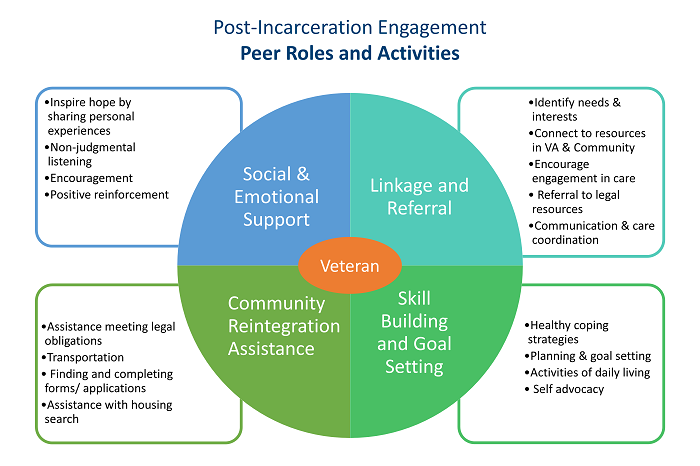Takeaway: The Post-Incarceration Engagement (PIE) model expanded to five additional sites through VA's Homeless Programs Office financial support for peer-support specialists. As of the end of 2023, 191 Veterans received intensive post-release PIE peer-support services at sites in Arkansas, Nevada, New Hampshire, and Texas. This year, Illinois also begins adding PIE services.
More than 640,000 individuals are released from state and federal prisons annually. In addition, recent statistics show that approximately 107,400 Veterans were completing sentences in either state or federal prison.1 According to the American Medical Association (AMA), 54% of state prisoners and 45% of federal prisoners reported mental health concerns. In addition, several studies have found a higher risk of suicide among individuals right after release from prison, including one study in Washington state that found people who had spent time in prison were 62% more likely to die by suicide than people who had not been in prison.2
PIE Peer Specialists work with VA re-entry case managers by providing support to Veterans during incarceration, on the day of release, and post-release. They also may provide transportation, link Veterans to housing, healthcare, benefits, employment, and community resources, and support their engagement with family. Overall, peer specialists enhance the chances of Veterans’ successful reintegration.
The Post-Incarceration Engagement (PIE) program is a peer-support intervention that supplements VA’s Health Care for Re-entry Veterans (HCRV) and Veterans Justice Outreach (VJO) services. PIE, in conjunction with these services, helps Veterans return safely back to community settings and ensures that Veterans connect to and stay engaged in appropriate VA primary care, mental health, and substance use treatment services. PIE also supports access to housing, employment, benefits, and legal services. Further, it re-connects Veterans to family and guides them to community-based resources.
For this study (Hyde et al., 2022), HSR investigators developed and pilot-tested a PIE peer-support intervention designed to provide social, emotional, and logistical support – and to promote linkage and engagement in healthcare for returning Veterans. All Veterans in this study were enrolled between November 1, 2017, and September 30, 2019, and were U.S. military Veterans in Massachusetts (n = 79) who were being released from prison or jail and were eligible for VA health services.
The PIE peer-support intervention draws on a Whole Health approach to care, which is a growing movement within VA healthcare to move from a disease-centric to a whole person model of care.
PIE peer-specialists provided tailored services to Veterans involved in the justice system and worked in conjunction with an HCRV case manager. PIE participants were placed in housing upon release, often in VA domiciliary programs or Veterans’ temporary housing programs. The historical comparison group comprised Veterans (n = 36) who received HCRV program support but did not receive PIE peer support. Outcomes regarding linkage to and engagement in healthcare were evaluated using the historical comparison group. Engagement in peer support, housing status, and reincarceration rates were monitored for the intervention group.

PIE participants were significantly more likely to receive substance use treatment than Veterans in the historical comparison group (86% vs 19%); engagement in mental health services was also greater for Veterans in the intervention group compared to the comparison group (93% vs 64%).
There were no significant differences between groups for emergency department use or hospitalization. At the end of the study period, the majority of Veterans in the intervention group who had been released for more than one year were living in permanent housing (84%). Further, recidivism among Veterans in the intervention group was low, with 7% re-arrested during the study period.
Hyde J, Petrakis B, Yakovchenko V, et al. Enhancing community integration after incarceration: Findings from a prospective study of an intensive peer-support intervention for Veterans with historical comparison group. Health & Justice. November 8, 2022;10(1):33.
The Post-Incarceration Engagement (PIE) program has been expanded to five additional sites through VA’s Homeless Programs Office financial support for peer-support specialists. As of December 2023, at expansion sites in Arkansas, Nevada, New Hampshire, and Texas, outreach to offer PIE support was made to 650 incarcerated Veterans. There were 191 Veterans who enrolled and received PIE services post-release. Across sites, 29 VA staff were trained, including peers, HCRV/VJO specialists, and clinical supervisors. This year, Veterans in Illinois also will begin participating in the PIE program.
If you or someone you know needs help: Each VA Regional Office has a Homeless Outreach Coordinator who may assist justice-involved Veterans. Please call VA's National Call Center for Homeless Veterans at 1-877-4AID-VET (1-877-424-3838) to be connected with a homeless coordinator in your area.